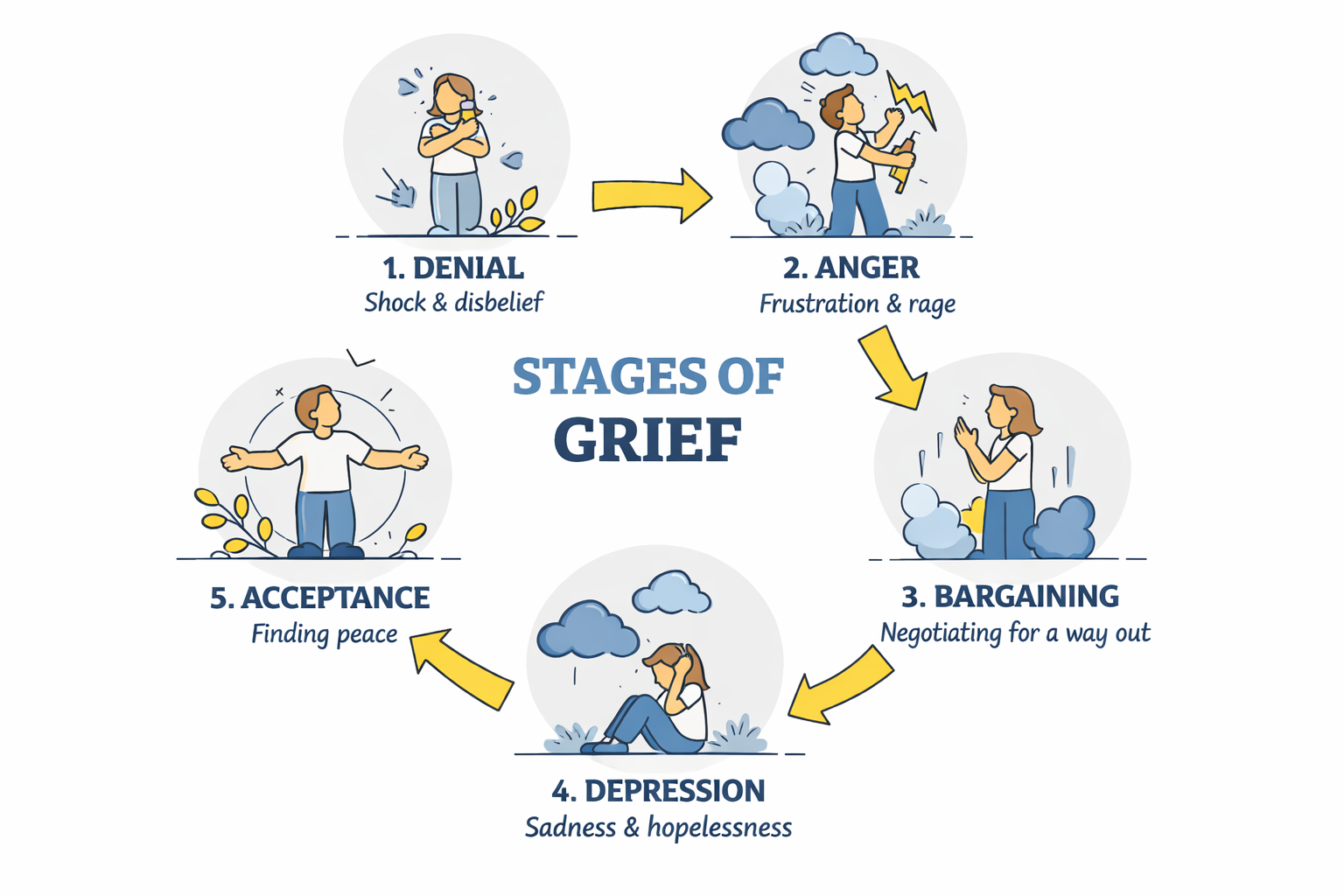The 5 Stages of Grief Explained—And Why Everyone Experiences Them Differently
When someone we love passes away or we face a major life loss, emotions can feel overwhelming, unpredictable, and even confusing. You may ask yourself: “What are the five stages of grief and loss?” This model, first introduced by psychiatrist Elisabeth Kübler-Ross in 1969, outlines the common emotional stages people may go through when coping with loss. While not everyone experiences them in the same order, the framework helps us better understand grief and validates the wide range of emotions we feel.
In this article, we’ll walk through the five stages of grief, why they’re not as linear as people think, and how recognizing them can help you on your journey of healing.
What Are the Five Stages of Grief?
The five stages of grief are:
Denial
Anger
Bargaining
Depression
Acceptance
These stages describe the emotional responses people may have when faced with significant loss, most commonly, the death of a loved one. But they can also apply to other forms of grief, such as divorce, job loss, illness, or other major life transitions.
It’s important to note that grief doesn’t follow a neat, step-by-step timeline. You might move back and forth between stages, skip one entirely, or feel multiple stages at once. The grief cycle is unique to every person.
Stage One: Denial
Denial is often the mind’s first defense against overwhelming pain. It can feel like numbness, shock, or disbelief. You may find yourself saying, “This can’t be real,” or going about your daily life as though nothing has changed.
Denial acts as a buffer, giving you time to process the reality of the loss slowly. For some, it lasts only a short period; for others, it may linger longer. Denial isn’t about refusing the truth; it’s your body and mind’s way of protecting you until you’re ready to face the weight of your grief.
Stage Two: Anger
Once the shock wears off, anger often rises to the surface. You may feel frustrated with yourself, with others, or even with the person who died. Some people direct their anger at doctors, God, or the unfairness of life itself.
This stage can feel uncomfortable because society often discourages open expressions of anger. But anger is a natural part of grief; it’s a way of channeling the intensity of pain into something more active. Recognizing it as a stage of healing can prevent you from bottling it up or feeling ashamed of it.
Stage Three: Bargaining
In the bargaining stage, you may find yourself replaying “what if” or “if only” scenarios. What if I had taken them to the doctor sooner? If only I had done things differently. These thoughts are part of trying to regain a sense of control when life feels completely out of control.
For people with spiritual or religious beliefs, bargaining might take the form of promises to a higher power: “If you bring them back, I’ll be a better person.” Although it doesn’t change the outcome, bargaining reflects the deep yearning to undo the loss and highlights the human need for meaning.
Stage Four: Depression
Depression in grief isn’t the same as clinical depression, though the two can overlap. This stage brings a deep sense of sadness, emptiness, and despair. You may lose interest in daily activities, feel withdrawn, or have trouble sleeping and eating.
It’s one of the longest and most challenging stages of grief, but it’s also a sign that you’re confronting the reality of your loss head-on. While painful, allowing yourself to feel sadness can help you process emotions rather than suppress them. Seeking support during this stage, whether through loved ones, support groups, or professional counselling, can make a tremendous difference.
Stage Five: Acceptance
Acceptance doesn’t mean you’re “over” the loss or that you no longer feel sadness. Instead, it means you’ve come to terms with the reality of the situation. You begin to find ways to live with the grief while still moving forward with your life.
In this stage, you may start creating new routines, rediscovering joy, and even finding ways to honor your loved one’s memory. Acceptance is about integration: carrying the love and memories with you while continuing to live fully.
What Is The Toughest Stage Of Grief?
While every person’s grief journey is unique, many mental health professionals and people who have experienced loss agree that the depression stage is often the hardest. Unlike denial, anger, or bargaining, which can feel more active, depression tends to be quiet, heavy, and isolating.
During this stage, people may withdraw socially, lose motivation, and struggle to find meaning in their daily lives. The sheer weight of sadness, combined with the physical exhaustion that grief often brings, makes this stage particularly draining.
That said, some find anger the hardest to manage because it can damage relationships, while others feel denial lingers longest and delays healing. The “toughest” stage depends on the individual, their support system, and their coping style. What’s important is to recognize that whichever stage feels most difficult, it is a natural part of the healing process, and support is available to help navigate it.
Why the Stages Aren’t Linear
A common misconception is that grief is a straight line: first denial, then anger, bargaining, depression, and finally acceptance. In reality, grief is far messier. You may cycle between anger and depression, experience acceptance only to feel denial again later, or skip some stages altogether.
Think of the stages as signposts rather than steps on a ladder. They describe the emotions many people encounter during grief, but there’s no “right” way to grieve. Your journey is unique, and moving through these stages may take weeks, months, or even years.
How to Cope With the Stages of Grief
Understanding the stages of grief is only the first step. Coping with them requires patience, self-compassion, and support. Here are some strategies that may help:
Allow your feelings: Whatever stage you’re in, remind yourself that your emotions are valid. Don’t pressure yourself to “get over it” quickly.
Seek connection: Talking about your grief with supportive friends, family, or support groups helps you feel less alone.
Practice self-care: Sleep, nutrition, and exercise may seem secondary during grief, but they are vital for emotional resilience.
Honor your loved one: Rituals like lighting a candle, creating a memory box, or journaling about your loved one can turn grief into meaningful remembrance.
Get professional support: If grief feels overwhelming or persistent, grief counselling or therapy can provide tools for navigating the journey.
Final Thoughts
So, what are the five stages of grief and loss? They are denial, anger, bargaining, depression, and acceptance, a framework that helps us understand the complexity of grief. But remember, they are not a rigid checklist. Grief is deeply personal, and your journey may not look like anyone else’s.
By recognizing these stages, you can better understand your emotions, normalize your experiences, and take steps toward healing at your own pace.
If you’re struggling to cope with grief and need compassionate support, Wellman Psychology offers grief counselling in Chicago, IL. Our experienced therapists provide a safe space to process your emotions and guide you toward healing. Contact us today to book an appointment and take the first step toward emotional recovery.
Feel free to check out our social media links below:
Find out more articles that can help you below:






